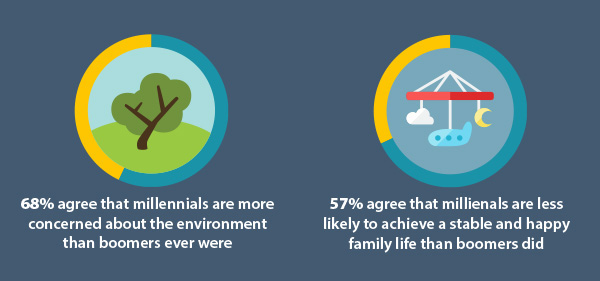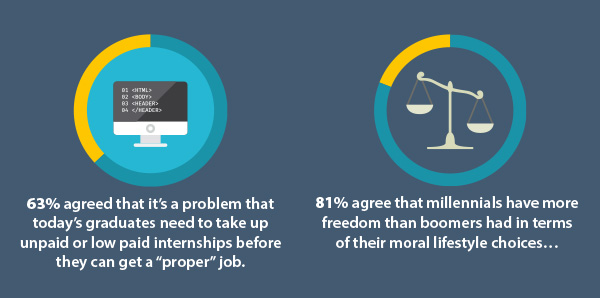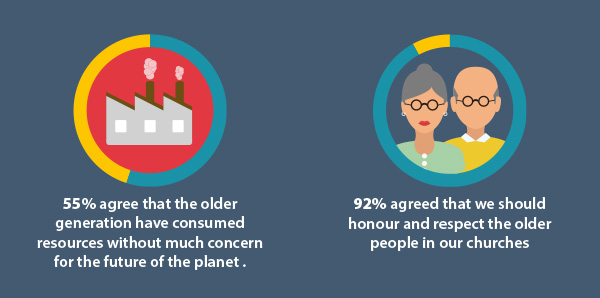27 June 2016
Millennials to boomers: is the Church really one body in Christ?
There's been a lot in the news recently about the widening gap between the generations. To understand how this issue affects the Church, the Evangelical Alliance surveyed 1685 evangelical Christians about intergenerational relationships.
In terms of marriage and family differences, we found that 93 per cent of our boomers – those born before 1960 – say they have been married at least once, compared with 89 per cent of our middle aged group and 59 per cent of our millennials – those born since 1980. Also 84 per cent of boomers were married before the age of 30 along with 57 per cent of millennials. In comparison to the general population, a recent Guardian article called Marriage problems: more than a third of people are single or have never married, states the following:
"Harry Benson, research director of Marriage Foundation, a thinktank that promotes marriage, said: 'On our own current estimates, 90 per cent of 60- ear-olds have married at some stage, whereas only 50 per cent of today's young adults will do so. If we want more of our young two-parent families to succeed as couples, the older generation have got a lot of encouraging to do.'"

It seems that evangelicals are more likely than the general population to marry and to do so by age 30, but there is a similar generational decline in early marriage down the generations.
Looking at the economic issues between the generations, 60 per cent of those surveyed said that millennials are more likely to end up in poverty and debt than boomers ever were. This is significant; again referring back to the Guardian series, another article entitled Revealed: the 30-year economic betrayal dragging down Generation Y's income states: "A combination of debt, joblessness, globalisation, demographics and rising house prices is depressing the incomes and prospects of millions of young people across the developed world, resulting in unprecedented inequality between generations."
The article goes on to say that: "Millennials interviewed by the Guardian said they felt their generation was facing far greater hurdles to establish themselves as independent adults than previous generations did." There is a reflection of this in our survey where 69 per cent of those surveyed overall said that life will be more precarious for millennials than for the boomer generation.

While considering the generational relationships within the Church, 72 per cent said their church runs a crèche and 71 per cent have classes and groups for primary school age children, as opposed to 14 per cent saying there are ministries for frail, elderly/ dementia support. Could this highlight a gap in the way we are caring for the elderly in our churches, placing more importance on the younger generation? Many of those surveyed agree, as 76 per cent agree that "a church can't really be healthy unless there is a good mix of generations".
47 per cent of the evangelical respondents agree that "older people in our church are very good at sharing their experiences with children and young people", illustrating that where this is already happening in churches, successful connectedness is occurring across the generations.

Our consumer culture clearly sees big gaps between age groups as marketing opportunities. However, the issue of generational differences is important for the integrity and the witness of the Church. Although the Bible clearly recognises and celebrates the young, the old and everybody in between, it also describes God's people as a unit or 'one body'. At the Alliance, we are driven by the last prayer of Jesus for unity: "that all of them may be one, Father, just as you are in me and I am in you. May they also be in us so that the world may believe that you have sent me." (John 17: 21). It seems that a united Church is an effective Church, and we all have a responsibility to play our part in supporting each other.
We hope that this research will encourage different generations of the Christians to connect more closely in order to provide a counter-cultural model of heaven to our lost and divided world.
You might also be interested in
- 31 Jul 2018 The Evangelical Alliance to lead a series of seminars at the Christian Resources Exhibition
- 11 Jul 2018 Girls’ Brigade gives hope in Manchester
- 29 Jun 2018 Transforming Lives for Good founder wins Change Maker of the Year award
- 28 Jun 2018 idea: Caribbean communities’ contribution to the UK
- 28 Jun 2018 idea: Better diagnosis for a healthier church: reviewing the debate on ‘spiritual abuse’

